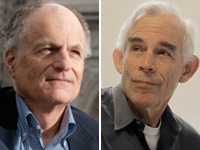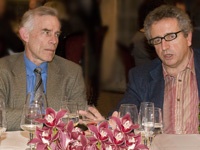community
Nobel Prize in Economics for Profs. Sargent and Sims increases GSE Scientific Council Nobel count to 11

On Monday, Prof. Thomas J. Sargent (New York University) and Prof. Christopher A. Sims (Princeton University) were named winners of the 2011 Nobel Memorial Prize in Economics for their “empirical research on cause and effect in the macroeconomy.” Both of the winners have strong ties to the BSE community and to some members of its faculty.
BSE Scientific Council
Both Prof. Sargent and Prof. Sims are members of the BSE Scientific Council, a body of leading academics that works with the School to ensure the quality of its research and programs while strengthening the GSE’s relationships with the wider academic community.
This year’s Nobel Prize for Profs. Sargent and Sims increases to 11 the number of Nobel Prize laureates on the GSE Scientific Council, which is chaired by Prof. Hugo Sonnenschein (University of Chicago). Fully one third of the Council’s members have now been selected to receive the Nobel Prize.
Academic collaboration with BSE faculty
The 2011 Nobel winners have worked directly with BSE Affiliated Professors, both as thesis directors and as co-authors. Among the many PhDs directed by Prof. Sims who are now teaching around the world are Prof. Fabio Canova (UPF and BSE), Prof. Teresa Garcia-Milà (UPF and BSE), and Prof. Albert Marcet (IAE and BSE). Prof. Sargent was on Prof. Garcia-Milà’s thesis committee.
Prof. Marcet has co-authored several papers with Prof. Sargent over the years, including one in 2010 on “Convergence of Least Squares Learning in Environments With Private Information.” BSE Chairman Prof. Ramon Marimon (EUI, UPF and BSE) has also coauthored papers with Prof. Sargent, and was the first European elected President of the Society for Economic Dynamics (SED), founded by Prof. Sargent himself in 1992.
Impact on economic research, teaching, and institutions
Prof. Marimon considers this year’s Nobel Prize “an award for the scientific method” that recognizes the work of two social scientists who developed new econometric methods for the analysis of dynamic models with expectations. These methods are now part of the toolbox of empirical macroeconomists in academia and central banks.
“Both Prof. Sargent and Prof. Sims have had an enormous impact in graduate teaching, through their methods, such as the vector autoregression or VAR models advocated by Prof. Sims, which are now taught in all applied macroeconomics courses, as well as through their textbooks–Sargent and Ljunqvist’s Recursive Macroeconomics is the standard graduate textbook in dynamic macroeconomics,” Prof. Marimon said.
Prof. Marimon also remarked on the strong commitment to research and institution-building in Economics that both Prof. Sargent and Prof. Sims have demonstrated over the years. “Their membership on the BSE Scientific Council is proof of this commitment and, at the same time, of the international endorsement of BSE,” Prof. Marimon said.
Membership on the GSE’s Scientific Council since the School’s consolidation five years ago is only the most recent link between the BSE and the 2011 Economics Nobel winners. Both have connections with the School community that go back many years: Prof. Sargent gave the inaugural lecture of the Department of Economics and Business at Universitat Pompeu Fabra (UPF) in 1991, the second year of its existence; Prof. Sims gave the same lecture in 1996. The department is one of the four academic bodies that comprise the BSE Economics community.
Nobel Prize laureates on the BSE Scientific Council:
|
|
A twelfth Nobel laureate on the GSE Scientific Council, Paul A. Samuelson (Massachusetts Institute of Technology), passed away in 2009.
Recipients of the Nobel Prize in Economics are chosen by the Royal Swedish Academy of Sciences. The award was created in 1968, and its official name is the Sveriges Riksbank Prize in Economic Sciences in Memory of Alfred Nobel.
Selection of papers co-authored by Prof. Thomas J. Sargent (NYU) and BSE affiliated professors:
|
Albert Marcet and Thomas J. Sargent, 2010. "Convergence of Least Squares Learning in Environments With Private Information," Levine's Working Paper Archive 240, David K. Levine. |
|
S. Rao Aiyagari, Albert Marcet, Thomas J. Sargent and Juha Seppala, 2002. "Optimal Taxation without State-Contingent Debt," Journal of Political Economy, University of Chicago Press, vol. 110(6), pages 1220-1254, December. |
|
Albert Marcent and Thomas J. Sargent, 1988. "The Fate of Systems with "Adaptive" Expectations," American Economic Review, American Economic Association, vol. 78(2), pages 168-72, May. |
|
Ramon Marimon, Ellen McGrattan and Thomas J. Sargent, 1990. "Money as a medium of exchange in an economy with artificially intelligent agents," Journal of Economic Dynamics and Control, Elsevier, vol. 14(2), pages 329-373, May.
|
2011 Nobel Prize in Economics

This year's Nobel Prize laureates in Economics, Thomas J. Sargent (NYU) and Christopher A. Sims (Princeton), both have strong ties to the BSE community.

Prof. Christopher A. Sims (Princeton) with Prof. Ramon Marimon (EUI, UPF and GSE) at the first meeting of the BSE Scientific Council in 2008.
